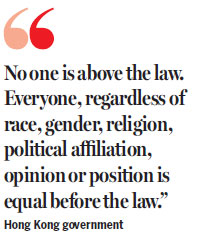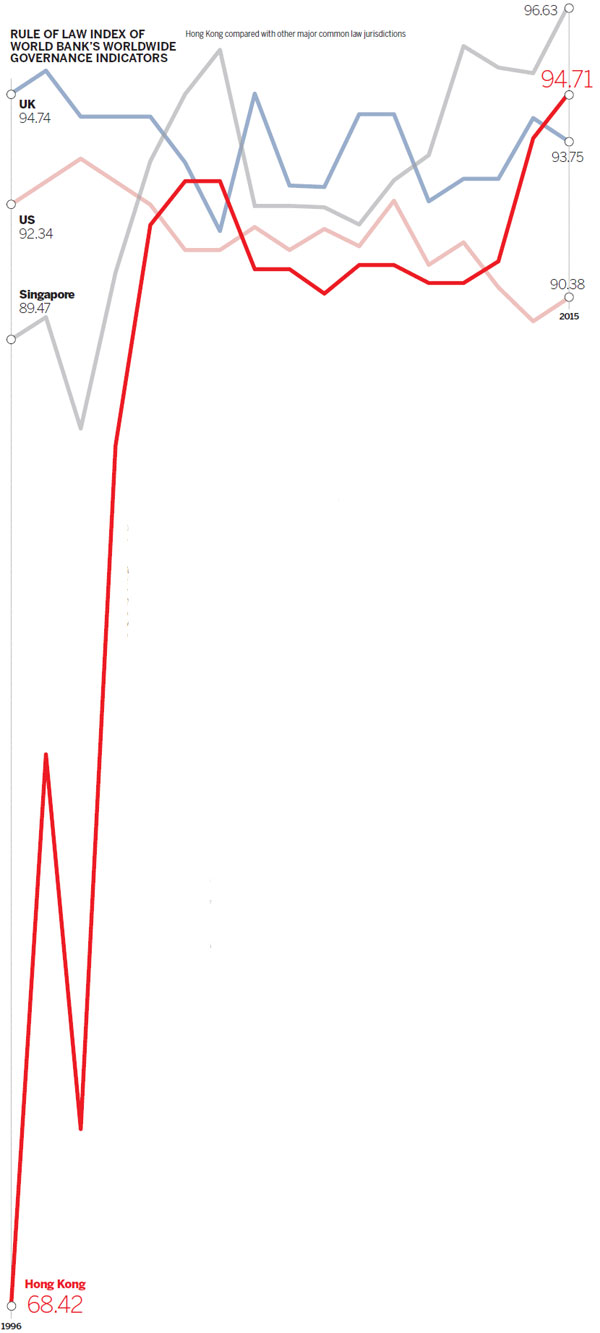HK shines when it comes to rule of law
Updated: 2017-07-01 08:03
By Luis Liu in Hong Kong(HK Edition)
|
|||||||||
Global benchmarks put city near the top of jurisdictions worldwide, a marked improvement on pre-handover status
When China and the United Kingdom began to negotiate Hong Kong's future in the 1980s, there was skepticism about what would happen to the city's common law system. Mistrust by the international community endured after the Chinese government proposed the unprecedented "one country, two systems" principle.
The past 20 years continued to see criticism about the Hong Kong Special Administrative Region's "failure" which worsened the rule of law and judicial independence - especially from the city's opposition camp.
However, statistics tell a different story.
The World Bank's Worldwide Governance Indicators project put Hong Kong at the 94.7 percentile for rule of law in 2015. The figures show the city outranked 94.7 percent of 113 countries and regions assessed.
In the same year, the United Kingdom was at 93.8 and the United States at 90.4. Singapore - Hong Kong's all-time rival - was at 96.6.
In 1996, a year before Hong Kong's return to China after 150 years of British rule, Hong Kong only scored 68.4.
At a symposium in Beijing commemorating the 20th anniversary of implementing the Basic Law, top national legislator Zhang Dejiang said the world-renowned index showed the rule of law in Hong Kong, one of the issues that concern the international community most, had been proved a success.
Other indicators have shown similar results. In the World Justice Project Rule of Law Index, one of the world's leading sources for original, independent data on the rule of law, Hong Kong scored 0.77 out of 1 last year. This was 16th in global rankings and third in Asia, only behind Singapore and Japan. Leading the list are mainly Nordic countries including Denmark, Norway, Finland and Sweden.
In the Global Competitiveness Report 2016-2017 published by the World Economic Forum last September, another reputable index, Hong Kong was the only Asian economy that was ranked in the top 10 on judicial independence out of 138 jurisdictions, and came third among common law jurisdictions.
The incumbent President of UK's Supreme Court and a non-permanent judge of Hong Kong's Court of Final Appeal David Neuberger said concerns about the city's judicial independence had been exaggerated.
"The concern reminds me of the worries which some UK judges have about the fact that their email address ends with '.gov.uk'. 'We are not part of the government; we are independent', they cry."
Thus during a visit to the UK for promotion of Hong Kong's legal system, Secretary for Justice Rimsky Yuen Kwok-keung expressed his hopes for the international community to look at figures instead of just listening to opinions of some media.
"Admittedly, the rule of law has become a very popular topic in Hong Kong, and it often attracts attention in the media, including overseas media," Yuen said.
"The views expressed through these channels are admittedly very divergent. On my part, I would invite you to make a distinction between mere assertions on subjective perception on the one hand and objective facts on the other," Yuen stressed.
Veteran political analyst and Basic Law expert Song Sio-chong said: "It is not hard to see Hong Kong's strength in its legal system under the current 'one country, two systems', especially when comparing with other developed countries and regions."
The Basic Law provided a real guarantee on Hong Kong's judicial independence and rule of law, Song said.
The city's high global rankings in the rule of law can be attributed to a society with little tolerance for corruption, and world-class order and security, Song stressed.

The city's civilized law-enforcement authorities, civil justice, effective access for civilians to legal services and freedom of expressions also added to its high scores, Song analyzed.
Final adjudication
One change that makes the judiciary more independent after 1997 is the shift of the final appellate court from outside to within the city, Song said. It symbolized the return of judicial power to Hong Kong, he added.
Before and when the Basic Law was promulgated in 1990, the final avenue of appeal for cases heard in Hong Kong was the Judicial Committee of the UK's Privy Council. To address this inconsistency with China's resumption of the exercise of sovereignty over the city, the Basic Law stipulates that a Court of Final Appeal (CFA) should be established in Hong Kong.
The move, which handed the power of final adjudication to Hong Kong, has also raised the level of recognition of Hong Kong's legal system around the globe, Yuen noted. Yuen stressed that during the colonial days, decisions made by the Hong Kong courts were hardly cited by the final appellate courts in other common law jurisdictions. "However, since the CFA was established, we have seen a significant change in the scenario," Yuen stressed.
Moreover, the Basic Law lets judges from other common law jurisdictions sit on the CFA, allowing the court to draw on their experience while maintaining close links with other jurisdictions, Yuen said.
Currently, out of 22 judges, 17 are of non-Chinese nationalities, mainly from the UK, Australia and New Zealand, according to the CFA judge list.
Hong Kong is one of the few jurisdictions that allow foreign judges, besides Singapore and Dubai, according to a research by China Daily.
In terms of transparency, Hong Kong consistently remained in the top 20 economies with very low levels of corruption in the world, according to the Corruption Perceptions Index. The city was ranked the 15th least corrupt place among 176 countries and regions last year.
Meanwhile, Hong Kong has maintained its world-leading safety record among global metropolises, especially at a time when many face declining public order and escalating terrorism threats, according to a variety of global rankings on safety and on personal security.
Legal aid
Other than quantifiable aspects, a number of day-to-day practices also matter, Song said.
People's easy access to the courts or justice carried great weight in assessing how the rule of law was valued, Song said. Among other common law jurisdictions, Hong Kong has a robust legal aid system, he reckoned.
"In appropriate circumstances, applicants for judicial reviews would be granted legal aid so that they would be in a position to challenge administrative action or government policy with resources provided by the government."
Meanwhile, people of various political views have been provided with legal aid when they face litigation, Song explained. Those include protesters who participated in the illegal "Occupy Central" movement in 2014, and even those who created severe chaos in the Mong Kok riot last year, according to official documents.
According to law reports, many leading constitutional or human-rights cases went before the court with the support of legal aid. According to Hong Kong's latest annual budget, the government will fund its Legal Aid Department HK$996.8 million ($127.7 million), almost the same as that of the last year amid a steady increase.
In some other common law jurisdictions, launching a lawsuit entails great costs and determination especially during an economic slowdown, Song observed.
Some law firms some other jurisdictions, such as the United States, have deducted their free service hours while there are likely to be legal aid budget cuts, he noticed.
However, the Hong Kong government perseveres. "Safeguarded by an independent judiciary, the rule of law ensures a secure environment for people and organizations and a level playing field for business," the Hong Kong government said.
"No one is above the law. Everyone, regardless of race, gender, religion, political affiliation, opinion or position is equal before the law.
"Private individuals, legal persons and public entities all have the right to access courts to enforce legal rights or defend an action," it added.

(HK Edition 07/01/2017 page5)